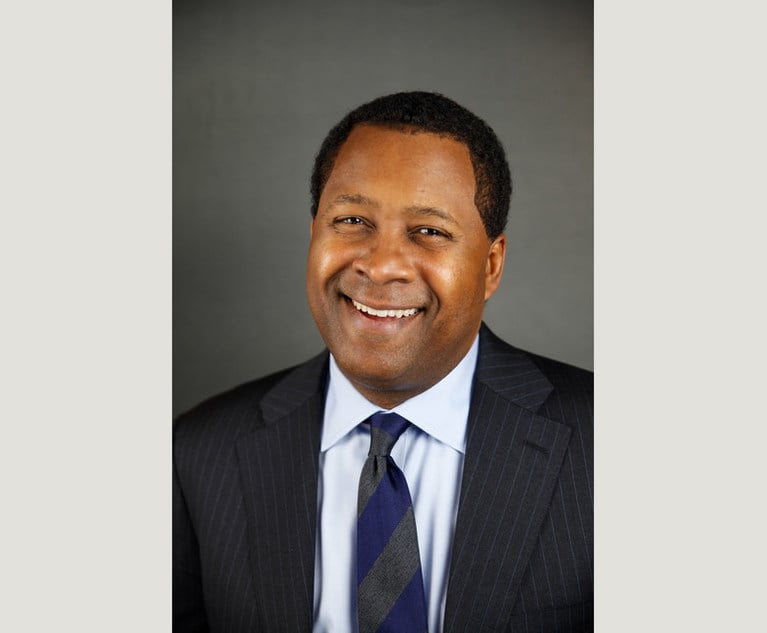Compliance Hot Spots: 'Unprecedented Threat to the Separation of Powers' | Microsoft Hires Latham Team | DOJ Revises Sanctions Enforcement Policy | Ex-Credit Suisse Exec Sues | Who Got the Work
Welcome to Compliance Hot Spots -- scroll down for a roundup of new amicus briefs in the CFPB case at the US Supreme Court. Plus: A Latham team, including Kathryn Ruemmler, will advocate for Microsoft in the epic Amazon cloud-computing case. More headlines, new engagements and more below. Thanks for reading!
December 17, 2019 at 09:00 PM
11 minute read
Welcome to Compliance Hot Spots and good evening from Washington. We're looking at the flood of amicus briefs in the big CFPB case the Supreme Court will hear in March. Speaking of the consumer bureau, Wilmer Hale's representing PayPal is a new suit against the agency. Scroll down for Who Got the Work, and for all the major headlines that caught our eye.
Tips, feedback and general thoughts on your practices are always appreciated. Contact C. Ryan Barber at [email protected] and 202-828-0315, or follow him on Twitter @cryanbarber. Contact Mike Scarcella at [email protected] and on Twitter @MikeScarcella. We're taking a holiday break next week but check for us the first week of January—happy holidays and Happy New Year to everyone. And thanks for reading our newsletter.
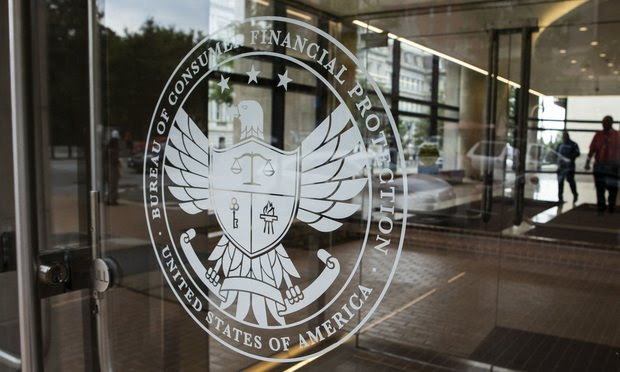
'This Agency Cannot Be Allowed to Operate As a Platonic Guardian'
The docket for the U.S. Supreme Court's big Consumer Financial Protection Bureau case—set for argument on March 3—is swelling with friend-of-the-court briefs.
The justices must decide whether the bureau's single-director structure—which only permits removal for cause—is constitutional. And the court must decide what the remedy is, if the justices say the scheme violations separation of powers.
The court is hearing now from groups and individuals either not taking sides or backing the challenger, Seila Law, represented by Kannon Shanmugam of Paul Weiss. The court appointed Kirkland & Ellis partner Paul Clement to defend the agency—and briefs supporting his position will be filed in the coming weeks.
In the meantime, here's a roundup of some of the amicus briefs that landed this week:
>> Consumer Bankers Association, represented by Norton Rose Fulbright's Jonathan Franklin, in support of neither party: "Dodd-Frank's text and history confirm that the 111th Congress valued the bureau's independence far more than its single-director leadership. As a result, reconstituting the bureau in the executive branch would yield a statute, agency, and politically charged regulatory environment Congress would unquestionably have rejected."
 >> 27 members of the US House, represented by Jones Day's Michael Carvin (at left), backing the petitioner: "The Consumer Financial Protection Bureau is an unprecedented threat to the separation of powers and to the democratic legitimacy of the federal government. By design, it is one of the nation's most powerful executive agencies. It has vast power to regulate the national economy by setting consumer protection policy and enforcing federal law. Under the Constitution, this agency cannot be allowed to operate as a Platonic guardian without any popular control."
>> 27 members of the US House, represented by Jones Day's Michael Carvin (at left), backing the petitioner: "The Consumer Financial Protection Bureau is an unprecedented threat to the separation of powers and to the democratic legitimacy of the federal government. By design, it is one of the nation's most powerful executive agencies. It has vast power to regulate the national economy by setting consumer protection policy and enforcing federal law. Under the Constitution, this agency cannot be allowed to operate as a Platonic guardian without any popular control."
>> Mortgage Bankers Association, represented by Benjamin Klubes of Buckley LLP, not taking sides: "The petitioner asks the court to forego the traditional severability analysis applied when courts hold a statute unconstitutional, or in the alternative to strike down the [Consumer Financial Protection Act] in its entirety. Either of these approaches would result in immediate and severe disruption to the real estate financing industry, causing significant harm to consumers and the economy at large."
>> Credit Union National Association, represented by Brownstein Hyatt Farber Schreck's Julian Ellis Jr., supporting the petitioner: "A remedy that disempowers the bureau negates the benefits of a single federal regulator for bank and non-bank firms. To preserve the consumer-protection benefits that the CFPB provides, while remedying the unconstitutional power vested in the agency's director, CUNA advocates that the court vacate the lower court's decision and shift the responsibility for fixing the bureau's structure to the political branches."
>> Harpeth Financial Services, represented by Andrew Grossman of Baker & Hostetler: "The proper remedy, then, is to recognize that the civil investigatory demand at issue here, like all the Bureau's acts to date subject to separation-of-powers objections, is invalid and that its invalidity cannot be cured by ratification, which would leave the taint of unconstitutional action."
SPONSORED BY ALM
Boundless Opportunities: Being Ready for What Happens Next
Speaking to the increasing mobility and accelerating agility of the future-focused legal professional, Richard Robinson, director of legal operations and litigation Support at Toyota, is one of many industry thought leaders set to drive the business of law forward at Legalweek 2020. READ MORE
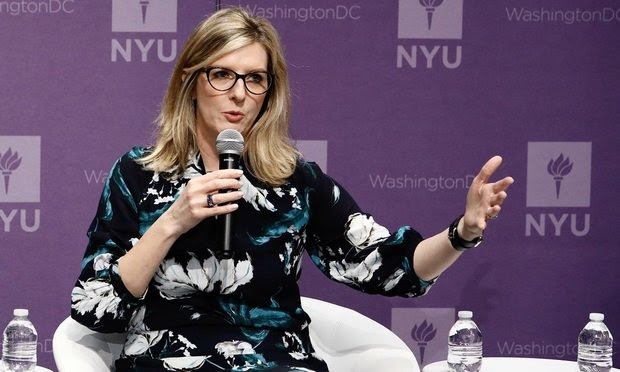
Who Got the Work
>> Lawyers from Latham & Watkins—including former Obama White House counsel Kathryn Ruemmler (above) and partners Roman Martinez and Abid Qureshi—are joining the Microsoft team defending the company's $10 billion Pentagon cloud contract in the US Court of Federal Claims. Microsoft's also represented by Robert Metzger of the Washington litigation boutique Rogers Joseph O'Donnell. The tech company is an intervenor in the blockbuster suit that Amazon Web Services. Amazon's hired lawyers from Gibson, Dunn & Crutcher—including Theodore Olson and Theodore Boutrous—and Morrison & Foerster.
>> Meanwhile, a Latham & Watkins team—including Joseph Serino Jr., Kuangyan Huang and Michael Jin—represent Credit Suisse in a whistleblower case at the U.S. Labor Department filed by a former executive named Colleen Graham. The WSJ reports: "A former Credit Suisse Group AG executive has told top bank executives and U.S. and Swiss authorities she believes she was put under surveillance in July 2017 while in a dispute with the bank, two years before a separate spying scandal rocked Credit Suisse. Colleen Graham, who worked for a joint venture half owned by the bank, said she believes a woman followed her over three days that month, allegedly in retaliation over her stance on an accounting issue at the joint venture." Robert Kraus and Desiree Gustafson of New York's Kraus & Zuchlewski represent Graham. Additionally, Jay Lefkowitz, Devora Allon and Thomas Burnett of Kirkland & Ellis represent Palantir Technologies Inc. Elizabeth Lewis, Elizabeth Inglis and Joseph Lockinger of Cooley represent Signac. Bloomberg has more here on Graham's case.
 >> A team from Wilmer Cutler Pickering Hale and Dorr, representing PayPal, last week sued the Consumer Financial Protection Bureau in Washington's federal trial court. "This action challenges a rule promulgated by the CFPB that requires PayPal to make misleading and confusing disclosures about the fees and functionalities of its products and places unreasonable restrictions on consumers' abilities to link certain credit products to their PayPal accounts," the complaint said. "As a result, the Bureau's rulemaking has resulted in consumer misunderstandings and confusion and has deprived PayPal's customers of access to significant benefits offered by PayPal." The Wilmer team includes financial regulatory partner Daniel Kearney and senior associates Justin Baxenberg and James Barton. Bloomberg Law has more here, and The Wall Street Journal here.
>> A team from Wilmer Cutler Pickering Hale and Dorr, representing PayPal, last week sued the Consumer Financial Protection Bureau in Washington's federal trial court. "This action challenges a rule promulgated by the CFPB that requires PayPal to make misleading and confusing disclosures about the fees and functionalities of its products and places unreasonable restrictions on consumers' abilities to link certain credit products to their PayPal accounts," the complaint said. "As a result, the Bureau's rulemaking has resulted in consumer misunderstandings and confusion and has deprived PayPal's customers of access to significant benefits offered by PayPal." The Wilmer team includes financial regulatory partner Daniel Kearney and senior associates Justin Baxenberg and James Barton. Bloomberg Law has more here, and The Wall Street Journal here.
>> Freeh, Sporkin & Sullivan partner Eugene Sullivan advised Tim Leissner as the former Goldman Sachs executive resolved charges that he bribed high-ranking government officials in Malaysia and Abu Dhabi to win business for the bank. Under his settlement with the Securities and Exchange Commission, Leissner agreed to give up nearly $44 million in ill-gotten gains and to be permanently barred from the securities industry. Leissner had previously pleaded guilty to criminal charges stemming from his efforts to land lucrative business from 1Malaysia Development Berhad, or 1MDB, an investment fund controlled by the Malaysian government that gave rise to a political scandal.
>> Baker, Donelson, Bearman, Caldwell & Berkowitz senior counsel John Miles represents the National Association for College Admission Counseling in a Justice Department antitrust case filed in Washington's federal trial court.
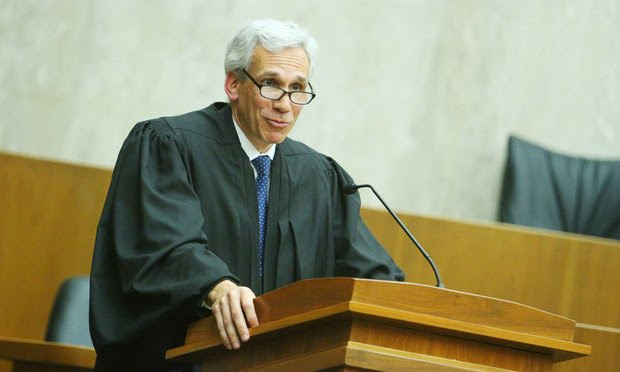
Compliance Corner: What We're Reading
Courts and cases
>> Judge Hits Trump Administration Over Census Docs Fight. "A federal judge slammed the Trump administration Friday for its handling of a showdown with Congress over records relating to the addition of a citizenship question to the 2020 census. The dispute led to Attorney General Bill Barr and Commerce Secretary Wilbur Ross being held in contempt of Congress in July. The House Oversight Committee filed suit last month to try to force the administration to turn over the subpoenaed records." U.S. District Judge Randolph Moss (above) said at the hearing: "I'm not sure it's appropriate almost a year after the subpoenas were served to say we haven't reviewed the documents yet…I think they need to." [Politico]
>> CFPB Challenger to SCOTUS: Let Congress Fix Bureau's Constitutional Flaw. "Both the Justice Department and a debt relief law firm challenging the constitutionality of the Consumer Financial Protection Bureau argued in briefs this week that the U.S. Supreme Court need not kill off the bureau because of criticisms that its unique structure violates separation of powers doctrine. But the two sides offered the justices quite different proposed remedies for the alleged constitutional flaw." [Reuters]
>> Amazon, Justice Department Spar over Redactions in Pentagon Cloud Lawsuit. "The Justice Department is pushing back on Amazon's decision to withhold certain information from the public in its lawsuit over President Trump's alleged interference in procurement matters." [The Washington Post] Amazon is represented by lawyers from Morrison & Foerster and Gibson, Dunn & Crutcher.
Policy and enforcement
 >> Justice Department Revises Policy on Export Control and Sanctions Enforcement. "The U.S. Justice Department has revised its enforcement policy on export control and sanctions in an effort to incentivize companies to voluntarily disclose potential violations and cooperate with investigations. The revised guidance comes as the Justice Department continues to standardize its voluntary disclosure policies across divisions. 'Protecting our nation's sensitive technologies and preventing transactions with sanctioned entities are DOJ priorities, but we cannot succeed alone," John Demers (at left), assistant attorney general for national security, said in a statement. 'We need the private sector to come forward and work with DOJ.'" [WSJ] Read the full announcement from Demers here.
>> Justice Department Revises Policy on Export Control and Sanctions Enforcement. "The U.S. Justice Department has revised its enforcement policy on export control and sanctions in an effort to incentivize companies to voluntarily disclose potential violations and cooperate with investigations. The revised guidance comes as the Justice Department continues to standardize its voluntary disclosure policies across divisions. 'Protecting our nation's sensitive technologies and preventing transactions with sanctioned entities are DOJ priorities, but we cannot succeed alone," John Demers (at left), assistant attorney general for national security, said in a statement. 'We need the private sector to come forward and work with DOJ.'" [WSJ] Read the full announcement from Demers here.
>> White House Releases Delayed Regulatory Data Sought by Democrats. "The final 2017 report estimating total benefits and costs of federal regulations was quietly posted by the Office of Management and Budget on Dec. 9, less than a week after a Senate Homeland Security and Governmental Affairs Committee hearing on Paul Ray's nomination to lead OMB's Office of Information and Regulatory Affairs. The next day, the committee announced it had scheduled a vote on Ray's nomination for Dec. 17." [Bloomberg Law]
>> The Future of Corporate Monitorships: Lessons Learned From the Walmart Case. "There has been much discussion following the Benczkowski Memo about the extent to which DOJ still views monitorships as a helpful and worthwhile compliance tool. Earlier this year, DOJ provided an affirmative answer to that question, imposing a two-year monitorship on Walmart as part of a non-prosecution agreement. That non-prosecution agreement resolved a multi-year inquiry surrounding alleged violations of the Foreign Corrupt Practices Act by Walmart subsidiaries in Mexico, Brazil, China and India. The approach taken by DOJ offers several important lessons for companies, their counsel, and compliance personnel regarding corporate monitorships." [Corporate Counsel]
>> Lawyers, Clients Concerned by Sweeping Commerce Dept. Draft Rules for Foreign IT Suppliers. International trade and national security lawyers said the regulation's broad scope introduces significant uncertainty for clients about which supply chain transactions might be affected, my colleague MP McQueen writes. [Corporate Counsel]
>> Overhaul of Anti-Redlining Law Sparks Rift Among Financial Regulators. "A proposed overhaul of a 40-year-old anti-redlining law has created a rift between three powerful financial regulators. The Office of the Comptroller of the Currency (OCC) and the Federal Deposit Insurance Corp. (FDIC) have unveiled an ambitious plan for updating the 1977 Community Reinvestment Act, which would give the banking industry new flexibility on meeting government-mandated goals for investing in poor neighborhoods. But the Federal Reserve has, so far, refused to sign on to the proposal." [Washington Post]
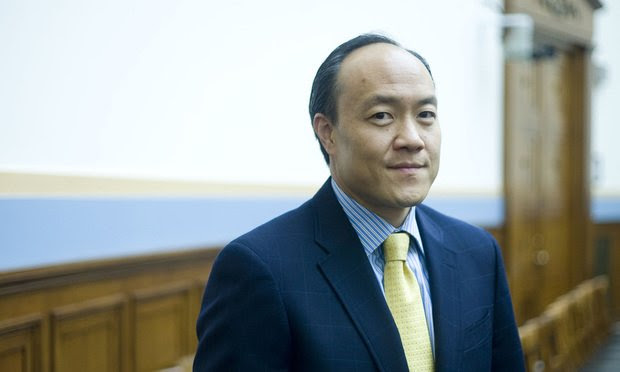
Notable Moves and Announcements
>> Harold Kim (above) has been named president of the US Chamber Institute for Legal Reform, taking the reins from Lisa Rickard, who has led the organization since 2003. Kim has held various White House and congressional roles during his career, and prior to government service he was a senior litigation associate at Patton Boggs.
>> Edward O'Callaghan, a former Clifford Chance partner who's been a Trump-era front-office leader at Main Justice, is planning to step down and return to private practice, The New York Times reports. "The primary liaison between the Justice Department and the special counsel's office is set to step down at the end of the month, after helping oversee the department's most consequential and controversial investigation in a generation," the Times report said. Here's a link to the financial disclosure O'Callaghan filed as part of his employment at Main Justice. He identified more than $2.2 million in Clifford Chance income.
This content has been archived. It is available through our partners, LexisNexis® and Bloomberg Law.
To view this content, please continue to their sites.
Not a Lexis Subscriber?
Subscribe Now
Not a Bloomberg Law Subscriber?
Subscribe Now
NOT FOR REPRINT
© 2025 ALM Global, LLC, All Rights Reserved. Request academic re-use from www.copyright.com. All other uses, submit a request to [email protected]. For more information visit Asset & Logo Licensing.
You Might Like
View All
Compliance Hot Spots: GOP Eyes ESG as an Antitrust Issue + Another DOJ Crypto Seizure + Sidley Partner Jumps to Main Justice
9 minute read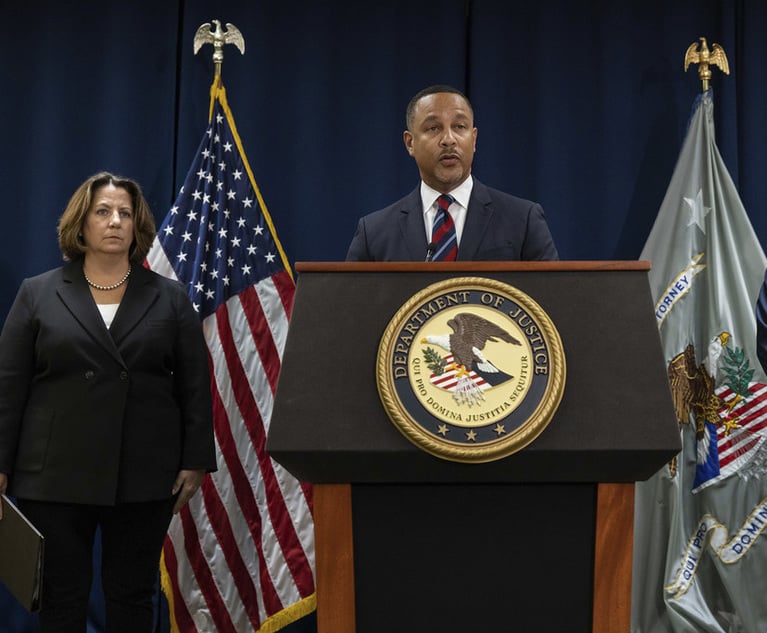
Compliance Hot Spots: Lessons from Lafarge + Fraud Section Chief Talks Compliance + Cravath Lands FTC Commissioner
11 minute readLaw Firms Mentioned
- Norton Rose Fulbright
- Brownstein Hyatt Farber Schreck, LLP
- Baker, Donelson, Bearman, Caldwell & Berkowitz, PC
- Paul Weiss Rifkind
- Jones Day
- Meyers Roman Friedberg And Amp; Lewis
- Clifford Chance
- Cooley
- Rogers Joseph O'Donnell A Professional Corporation
- Wilmer Cutler Pickering Hale and Dorr LLP
- Gibson Dunn Crutcher
- Squire Patton Boggs
Trending Stories
- 1New York Judge Steps Down After Conviction for Intoxicated Driving
- 2Keys to Maximizing Efficiency (and Vibes) When Navigating International Trade Compliance Crosschecks
- 3Houston Law Firm Files $250K Breach of Contract Suit Against 2 Former Lawyers
- 4The Week in Data Feb. 3: A Look at Legal Industry Trends by the Numbers
- 5Mass Tort Cases: Challenges for Plaintiff’s and Defense Counsel
Who Got The Work
J. Brugh Lower of Gibbons has entered an appearance for industrial equipment supplier Devco Corporation in a pending trademark infringement lawsuit. The suit, accusing the defendant of selling knock-off Graco products, was filed Dec. 18 in New Jersey District Court by Rivkin Radler on behalf of Graco Inc. and Graco Minnesota. The case, assigned to U.S. District Judge Zahid N. Quraishi, is 3:24-cv-11294, Graco Inc. et al v. Devco Corporation.
Who Got The Work
Rebecca Maller-Stein and Kent A. Yalowitz of Arnold & Porter Kaye Scholer have entered their appearances for Hanaco Venture Capital and its executives, Lior Prosor and David Frankel, in a pending securities lawsuit. The action, filed on Dec. 24 in New York Southern District Court by Zell, Aron & Co. on behalf of Goldeneye Advisors, accuses the defendants of negligently and fraudulently managing the plaintiff's $1 million investment. The case, assigned to U.S. District Judge Vernon S. Broderick, is 1:24-cv-09918, Goldeneye Advisors, LLC v. Hanaco Venture Capital, Ltd. et al.
Who Got The Work
Attorneys from A&O Shearman has stepped in as defense counsel for Toronto-Dominion Bank and other defendants in a pending securities class action. The suit, filed Dec. 11 in New York Southern District Court by Bleichmar Fonti & Auld, accuses the defendants of concealing the bank's 'pervasive' deficiencies in regards to its compliance with the Bank Secrecy Act and the quality of its anti-money laundering controls. The case, assigned to U.S. District Judge Arun Subramanian, is 1:24-cv-09445, Gonzalez v. The Toronto-Dominion Bank et al.
Who Got The Work
Crown Castle International, a Pennsylvania company providing shared communications infrastructure, has turned to Luke D. Wolf of Gordon Rees Scully Mansukhani to fend off a pending breach-of-contract lawsuit. The court action, filed Nov. 25 in Michigan Eastern District Court by Hooper Hathaway PC on behalf of The Town Residences LLC, accuses Crown Castle of failing to transfer approximately $30,000 in utility payments from T-Mobile in breach of a roof-top lease and assignment agreement. The case, assigned to U.S. District Judge Susan K. Declercq, is 2:24-cv-13131, The Town Residences LLC v. T-Mobile US, Inc. et al.
Who Got The Work
Wilfred P. Coronato and Daniel M. Schwartz of McCarter & English have stepped in as defense counsel to Electrolux Home Products Inc. in a pending product liability lawsuit. The court action, filed Nov. 26 in New York Eastern District Court by Poulos Lopiccolo PC and Nagel Rice LLP on behalf of David Stern, alleges that the defendant's refrigerators’ drawers and shelving repeatedly break and fall apart within months after purchase. The case, assigned to U.S. District Judge Joan M. Azrack, is 2:24-cv-08204, Stern v. Electrolux Home Products, Inc.
Featured Firms
Law Offices of Gary Martin Hays & Associates, P.C.
(470) 294-1674
Law Offices of Mark E. Salomone
(857) 444-6468
Smith & Hassler
(713) 739-1250




